#Music Business
Text



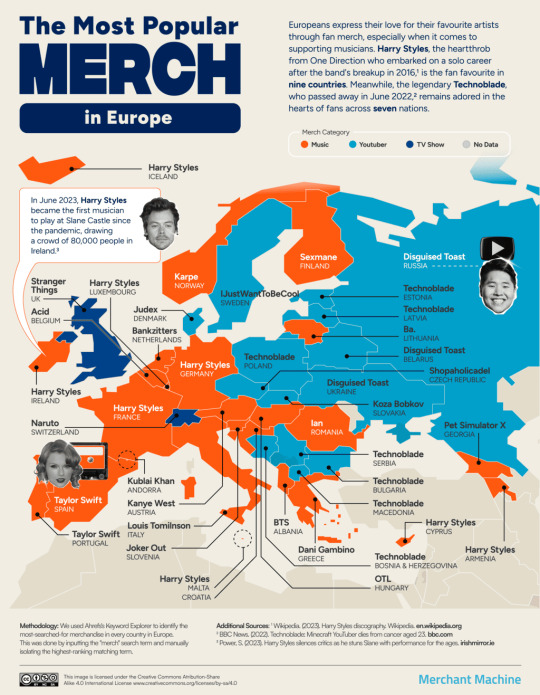


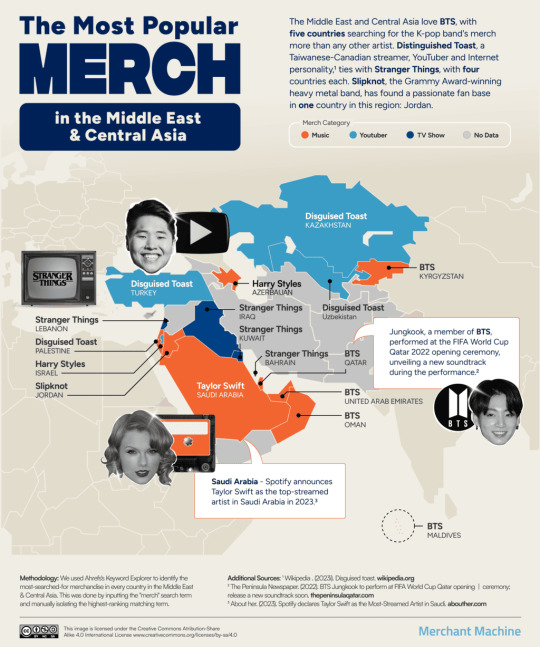

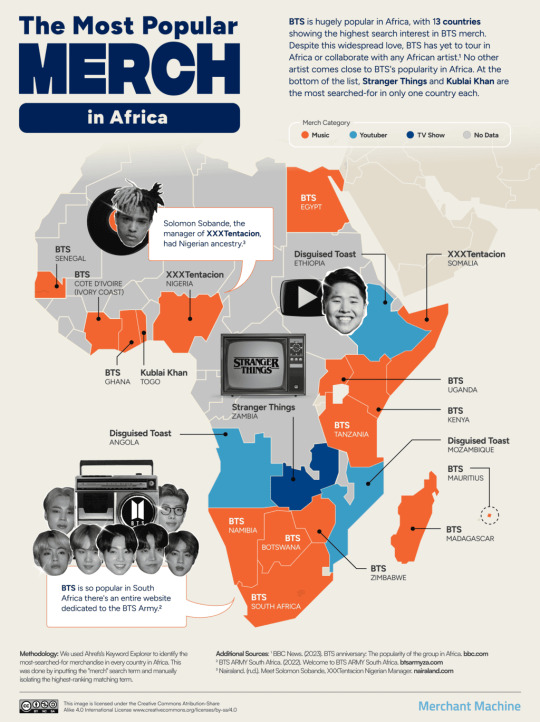
Harry’s is the 3rd most popular merch in the world and The number 1 most popular in Europe.
Louis’ is the most popular merch in Italy.
Read the full article here
76 notes
·
View notes
Text
From Pennies to Progress: How Pluto in Aquarius is Shaping the Music Industry with the Living Wage for Musicians Act
A recent bill introduced in Congress, the Living Wage for Musicians Act, is shaking things up in the music industry. But this isn’t just about fairer pay for artists — it’s a potent symbol of the astrological shift we’re currently experiencing with Pluto in Aquarius.
For those astrologically inclined, Pluto — the planet of transformation and revolution — has been transiting Aquarius, the sign of innovation and community, since 2023. This transit signifies a period of deep change for social structures, particularly those that have become outdated and inequitable.
The music industry is a prime example. Streaming services have revolutionized music consumption, but for many musicians, it’s a race to the bottom. Current royalty rates mean it takes millions of streams to earn a meager living. The Living Wage for Musicians Act proposes a minimum payout of one cent per stream, a significant increase that would offer a crucial lifeline to countless artists.
This act embodies the Aquarian spirit of progress. It challenges the status quo, prioritizing fairness and collective well-being over the profit margins of a few. This aligns perfectly with Pluto’s transformative power. The current system, where a select few reap the rewards while the creators struggle, is being dismantled.
Here’s how the Living Wage for Musicians Act reflects the influence of Pluto in Aquarius:
Strength in Numbers: How Aquarius Fuels the Collective Action Behind the Living Wage for Musicians Act
The Living Wage for Musicians Act isn’t just about a single politician championing a cause. It’s a powerful symbol of collective action, a concept deeply rooted in the astrological sign of Aquarius. Aquarius, with its emphasis on community, progress, and social change, thrives on collaboration and working towards a common goal. This collective spirit is precisely what’s driving the Act forward.
Here’s how the Aquarian influence manifests in the fight for fairer pay for musicians:
Uniting Diverse Voices: Aquarius transcends individual differences. The Act isn’t just about musicians; it’s a collaborative effort. Legislators, artist unions, and individual musicians have come together, recognizing their shared interest in fair compensation. This united front increases the Act’s visibility and strengthens its impact.
Community Power: Aquarius celebrates the collective. The Act isn’t a top-down decree. It’s a grassroots movement fueled by the collective power of the music community. Musicians are using their voices and platforms to raise awareness, garnering public support for the cause. This community power is a potent force that legislators can’t ignore.
Progress for All: Aquarius is a humanitarian sign. The Act isn’t just about individual gain; it’s about creating a fairer music industry for everyone. By securing a living wage, musicians can focus on creating art without financial anxieties. This ultimately benefits music fans who get to enjoy a richer and more diverse musical landscape.
The Aquarian spirit that encourages collaboration, community building, and social progress is what’s propelling this Act forward. With musicians, unions, and legislators working together, the fight for fair pay becomes a powerful force for positive change in the music industry.
Reimagining the Model: How Aquarius Embraces Tech to Drive Fair Pay in the Living Wage for Musicians Act
The rise of streaming services revolutionized music consumption, but for many musicians, it’s been a double-edged sword. While their music reaches a wider audience, current royalty rates make it nearly impossible to earn a living wage solely through streaming. The Living Wage for Musicians Act acknowledges this reality and embraces the power of technological innovation, another hallmark of Aquarius. This astrological sign thrives on progress and isn’t afraid to challenge the status quo. The Act leverages existing technology to create a new, more equitable compensation model for the digital age.
Here’s how the Act embodies the Aquarian spirit of technological innovation:
Adapting to Change: Aquarius is all about embracing the future. The Act recognizes that streaming is the dominant form of music consumption and doesn’t try to fight a losing battle. Instead, it proposes a solution that works within the existing technological framework.
Harnessing Existing Tech: Aquarius encourages using technology for good. The Act doesn’t require complex new systems. It proposes a tweak to the existing streaming model — a higher per-stream payout — that leverages the same technology platforms musicians already use
Building a New Future: Aquarius is a visionary sign. The Act isn’t just a temporary fix. It aims to create a sustainable model for artist compensation in the digital age. By ensuring musicians earn a living wage through streaming, the Act paves the way for a more vibrant and equitable music industry for years to come.
The Living Wage for Musicians Act isn’t a rejection of technology. It’s a testament to the Aquarian spirit of embracing innovation to solve problems and create a better future. By leveraging existing technology in a new way, the Act proposes a solution that’s both practical and forward-thinking. This innovative approach could revolutionize the way artists are compensated in the digital age, ensuring that music continues to thrive.
Challenging Power Structures: Pluto dismantles what’s no longer working. The Act challenges the current power dynamic in the music industry, pushing for a fairer distribution of wealth.
Disrupting the Status Quo: How Pluto in Aquarius Fuels the Fight for Fair Pay in the Music Industry
This isn’t just about raising artist compensation; it’s a challenge to the very foundation of the music industry. This audacious spirit aligns perfectly with the astrological influence of Pluto in Aquarius. Pluto, the planet of transformation and revolution, is currently transiting Aquarius, the sign of innovation and social justice. Together, they create a potent force for dismantling outdated systems and demanding a more equitable distribution of wealth.
Here’s how the Act embodies the transformative power of Pluto in Aquarius:
Shifting the Balance of Power: Aquarius seeks equality, and Pluto dismantles what no longer works. The Act challenges the current power dynamic in the music industry, where a select few streaming platforms and record labels hold immense power over artists’ livelihoods. By demanding a fairer share of revenue, the Act aims to redistribute wealth and give artists more control over their careers.
Exposing Inequalities: Pluto shines a light on hidden truths. The Act exposes the current royalty system’s unfairness, highlighting the disparity between the massive profits generated by streaming services and the meager payouts received by artists. This awareness is crucial for building public support and pressuring the industry to make a change.
Building a New Paradigm: Aquarius envisions a better future. The Act isn’t just about fixing a broken system; it’s about creating a new model for artist compensation in the digital age. By establishing a living wage for musicians, the Act paves the way for a more sustainable and equitable music industry where artists are valued for their contributions.
The Living Wage for Musicians Act isn’t a small-scale reform. It’s a direct challenge to the status quo, fueled by the transformative power of Pluto in Aquarius. By dismantling the existing power structures and demanding fairer pay for artists, the Act paves the way for a more just and sustainable music industry for everyone involved. This fight isn’t just about musicians; it’s a symbol of a larger societal shift towards a more equitable distribution of wealth and power.
While the artistic fire burns bright within creatives, neglecting the business side of things can leave them vulnerable. The music industry, for example, is full of cautionary tales of talented artists who are financially exploited simply because they lacked the knowledge to negotiate fair deals or manage their finances effectively. Building a strong business foundation doesn’t diminish the creative spirit; instead, it empowers it. By understanding basic business concepts like marketing, budgeting, and intellectual property rights, creatives can take control of their careers, secure fair compensation for their work, and ensure their artistic endeavors have a sustainable future. This allows them to focus their energy on what they do best — creating — without the constant worry of financial instability. In essence, a strong business foundation becomes the essential toolbelt that allows creatives to translate their artistic vision into a thriving and sustainable career.
This act is just one example of how Pluto in Aquarius is playing out. As this transit continues, expect to see more social and economic reforms that prioritize equality and innovation. Whether you’re a music lover or an astrology buff, this is a fascinating time to witness a transformation that could reshape the way artists are valued and compensated.
#business astrology#music business#entertainment news#entertainment business#astrology updates#astro#astrology facts#astro notes#astrology observations#astro posts#astrology#astrology community#astro girlies#astropost#astro observations#astrology notes#astro community
27 notes
·
View notes
Text
instagram
#coi leray#foodie#coileray#female rap artist#coilerayfanbase#coilerayfandom#coi the album#music business#megan thee stallion#big latto#latto#lola brooke#nicki minaj#Instagram
38 notes
·
View notes
Text
No bc I want a list of ALL the celebs at Diddy’s parties who got caught doing illegal shit and WHAT they were caught doing. 🧐
12 notes
·
View notes
Text
"The irony of making ill-judged, unnecessary and misleading comments...on the day that the launch of their new arena has unfortunately fallen into such difficulties is not lost on anyone in the music industry"
23rd April 2024 | By Max Pilley
The Music Venue Trust has told NME that comments made by Manchester’s Co-Op Live Arena about grassroots venues are “disrespectful and disingenuous”.
Earlier this week, the executive director of the major new 23,500 capacity venue said that some smaller venues in the UK are “poorly run” and dismissed calls for a £1 ticket levy on all gigs arena-sized and above.
please read the full article here at nme.com and support good, well-written and well-sourced music journalism! ✌️
(I'll update this post with the full text at some point)
#another great piece from nme#mvt calling out co op live's b.s.#co op live#music venue trust#uk live music#nme#23.04.24#music business#article#m
17 notes
·
View notes
Text
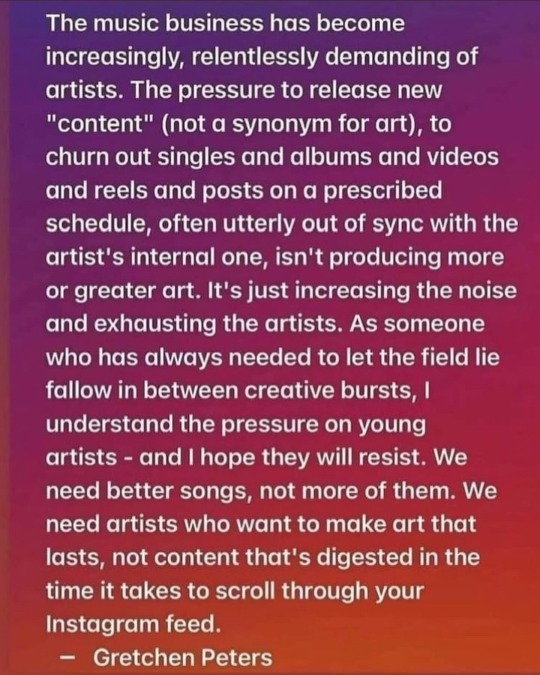
24 notes
·
View notes
Text

#evannahv#music#grammys#recording academy#Grammy u#black twitter#black girl aesthetic#black girl luxury#belizean#singer songwriter#singer#music business#sxsw#black femininity#girl moodboard#soft life#soft girl#beauty#soft asthetic#Belizean artist
21 notes
·
View notes
Note
hello!!
is it (legally) required to have some sort of permission to upload or publish remixes of hazbin hotel songs?
Short answer yes, long answer it depends what you mean by publish, and I love that I get in the weeds with music business stuff.
So - the recordings themselves and all pieces of them, like the instrumental stems and vocals, are all part of the A24-owned “master recordings” which you cannot use or sample or remix without a license from them. Technically you could make an un-monetized video or tiktok or something and probably won’t get in trouble for it, but they’ll have the rights to monetize it or take it down. Spotify/distrokid/any form of real distribution you for sure cannot do without a license.
That’s remixes - but covers are interesting. You can actually formally distribute song covers thanks to something called a “mandatory mechanical license” whereby if your distributor gives you the option (I know distrokid does) you can mark that the song is a cover, and it’ll fetch a cover license (which are generally automatically approved) from (usually) the Harry Fox Agency in the US. Now this does NOT give you permission to remix, interpolate, change, or put the song to video - THAT requires a license from the master recording owner (as described above) as well as the copyright owner (song copyright ownership is also known as ‘publishing’). This is how Taylor Swift was able to re-record her “Taylor’s Versions” of songs - she didn’t have control over her master recordings, but because she owned the copyright to those songs, she was able to make new master recordings from scratch.
Ultimately fanmade remixes often do not get taken down or get copyright strikes unless the remix in question is being monetized and distributed to platforms, because generally it is in content owners’ interest to allow social media users to make “UGC” (user generated content) as ultimately it’s more attention to that piece of music, but it IS up to the content owner’s discretion to decide to take action against it or not - and sometimes systems like YouTube’s Content ID will flag and fingerprint that content automatically without the content owner needed to see or ID the thing you made.
And unfortunately I cannot personally help anyone get cover or remix licenses to the Hazbin songs, that’s all A24 Music - I’ve been getting a lot of emails to that effect and I’m sorry I can’t be more helpful there.
Hope this was informative!
8 notes
·
View notes
Text

Labels Want to Prevent ‘Taylor’s Version’-Like Re-Recordings From Ever Happening Again
Warner Music Group, have recently overhauled contracts for new signees, according to top music attorneys, some demanding artists wait an unprecedented 10, 15 or even 30 years to re-record releases after departing their record companies. “The first time I saw it, I tried to get rid of it entirely,” says Josh Karp, a veteran attorney, who has viewed the new restrictions in UMG contracts. “I was just like, ‘What is this? This is strange. Why would we agree to further restrictions than we’ve agreed to in the past with the same label?'”
For decades, standard major-label recording contracts stated artists had to wait for the latter of two periods to expire before they could put out re-recorded versions, Swift-style: It could have been five to seven years from the release date of the original, or two years after the contract expired. Today, attorneys are receiving label contracts that expand that period to 10 or 15 years or more — and the attorneys are pushing back. “It becomes one of a multitude of items you’re fighting,” Karp says.
“I recently did a deal with a very big indie that had a 30-year re-record restriction in it. Which obviously is much longer than I’m used to seeing,” adds Gandhar Savur, attorney for Cigarettes After Sex, Built to Spill and Jeff Rosenstock. “I think the majors are also trying to expand their re-record restrictions but in a more measured way — they are generally not yet able to get away with making such extreme changes.”
Read more
Slow asses lol. I knew👏🏽 this shit was on its way from these losers. Majors are always left behind in the creative direction of music evolution and are determined to stifle an artist's level of (loopholed) independence within the machine. Taylor is out here doing peak-2000s CD era, first-week numbers on her old "new" shit (before that Dell Glover shift 🙃) and collecting luggage-size bags. Crash course:
In order to use the sound recordings from her first six albums, Swift would be required to license or buy them back from Shamrock Capital. However, as Swift owns the musical compositions and accompanying lyrics, she always had the exclusive right to perform and create adaptations of her songs subject to the terms of her original contract with Big Machine.
Once the restriction periods in her initial record deal began to expire (around late 2020 and likely determined from the date that each album was recorded), Swift began re-recording the music from her first six albums so that she would finally be able to own new master recordings of these songs. So far, Swift has released re-recordings of three out of six of her first albums, with her highly anticipated fourth re-recorded album to be released on 27 October this year. The re-recorded albums are being released as "Taylor's Versions". By doing this, Swift is able to own the copyright in the musical composition, lyrics and master recordings of her music, placing her in a stronger position to control the licensing and use of her music for better promotion and financial compensation. (x)
T.S. on all that shit. They are bothered bothered, honey. She's not the first to do it (think JoJo rerecording her first two albums after her forced release from Barry Hankerson, who tried to own her voice and name in perpetuity on some Ariel shit) nor the last (think Ashanti gearing up the re-recording of her debut album post-Irv Gotti). But Taylor's the first of this caliber (6 albums) and turnaround time. Artist-writers, who don't own their masters, been taking notes. But the main note they should've been taking is from that writer's strike. They been needed an overhaul. Working without ownership and nothing to show but fame and lint-balled pockets.
10 notes
·
View notes
Text
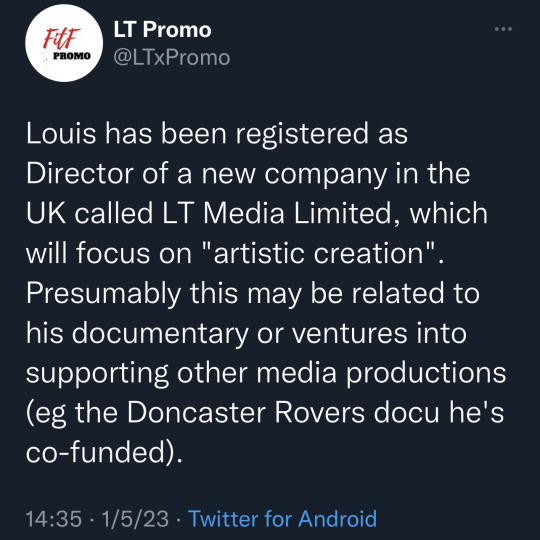
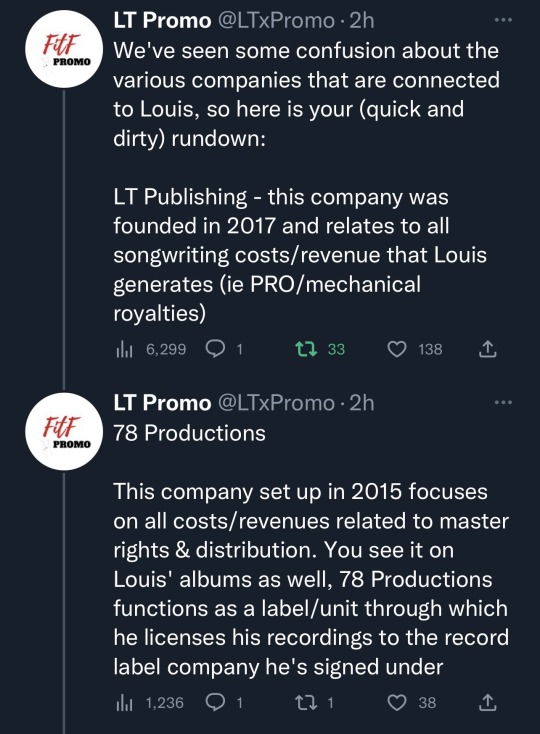


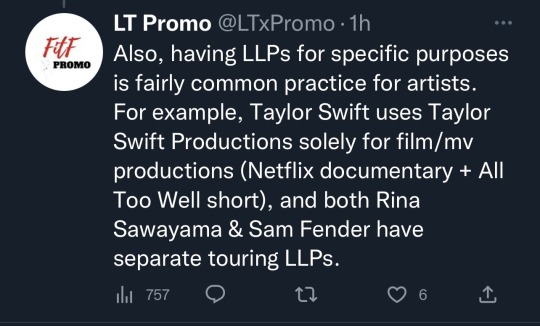
Link
#Louis’ companies#boss Louis#music business#Louis’ career#LT media#LT publishing#78 productions#LT touring#LT merch#triple strings#Louis January 2023#businessman Louis
192 notes
·
View notes
Text
TankTheTech on grammatically challenged managers & metal news site editors
#metal#metal news#music stuff#nightwish#tankthetech#autoplay#video#music business#i noticed only now that the video loops perfectly
12 notes
·
View notes
Text
2 notes
·
View notes
Text
Legal mistakes musicians make with Bobby Borg examines major legal mistakes that musician make today.
youtube
Hey Musicians! Rejection sucks...right! We'll find out how to handle it in this short 2-minute video by USC Professor and Author BOBBY BORG. You won't be disappointed. Peace.
33 notes
·
View notes
Text
23/4/24
The Music Venue Trust has hit back at Manchester’s Co-Op Live for saying some grassroots venues are “poorly run” – despite having had to delay its own opening this week.
Co-Op Live, which cost £365million, is set to become the UK’s largest indoor arena when it opens, with a capacity of 23,500.
The venue’s executive director Gary Roden spoke to the BBC recently, where he discussed the proposed £1 ticket levy on all gigs arena-sized and above, to help secure the future of grassroots venues and artists.
Roden said that he was “very aware it’s a hot topic”, and that he was “embracing the conversation”, but that he believed the levy was “too simplistic”.
The report suggests that he thinks support should come directly from the government, and added that while he acknowledges the financial pressures on small venues, he thinks some of them are poorly run.
-> full article here at nme.com
Music Venue Trust CEO Mark Davyd on twitter 20/4/24 :
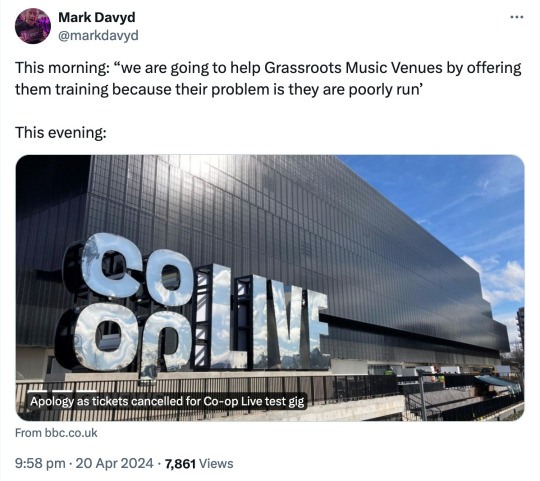
linking to this article:
20/4/24
Bosses of the UK's largest arena have apologised for cancelling tickets to a test show hours before it was due to start.
It comes after organisers at Co-op Live in Manchester said they had to cut capacity for a preview concert by Rick Astley to allow them to test the 23,500-seater venue "effectively".
Those affected have instead been invited to the Black Keys show at the £365m arena next week.
Co-op Live is set to be officially opened by comedian Peter Kay on Tuesday.
-> full article here at bbc.com
and then the day before the official opening night..
22/4/24
Organisers at Manchester’s new Co-Op Live arena have postponed their opening Peter Kay shows.
[..]
A statement from the venue said: “Following our first test event on Saturday, regretfully we have made the difficult decision to reschedule our two opening performances by Peter Kay. It is critical to ensure we have a consistent total power supply to our fully electric sustainable venue, the completion of which is a few days behind.
-> full article here at nme.com
#mostly for my own reference..#the saga of#co op live#greenwashing and refusing to support grassroots venues.. super sustainable yes 👍#uk live music#manchester#music venue trust#bbc news#20.04.24#nme#22.04.24#23.04.24#music business#music news#m
7 notes
·
View notes
Text
Non-Musical Ways to Overcome the Musician's Creative Block
As a musician who likely makes some or all of your income off your music, it can be very scary to have a block that stops you in your tracks. Losing your inspiration or the right words can be challenging, and the more strain you put on yourself to try and create, the harder it can get. Sometimes, you just need to change your strategy to overcome creative blocks. Here are several non-musical…
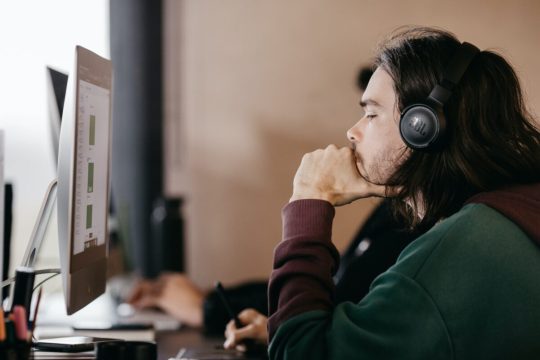
View On WordPress
#Creative Block#Creative Thinking#Indiana Lee#Music#Music Business#Music Industry#Music Inspiration#Musician
4 notes
·
View notes